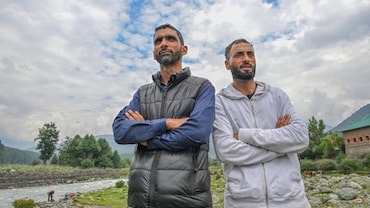- HOME
- /
- True Stories
- /
- Heroes
- /
From Darkness To Light: Noori Saleem Wages An Inspirational Battle Against HIV-AIDS
After a lifetime of battling discrimination and a terrifying diagnosis, Noori Saleem now offers sanctuary to others like her
 “Provisions should be made for the education and employment of people in the transgender community. Only this can help them stay away from sex work,” says Noori Saleem, founder of the South India Positive Network. (Photo: Jason NG./India Today)
“Provisions should be made for the education and employment of people in the transgender community. Only this can help them stay away from sex work,” says Noori Saleem, founder of the South India Positive Network. (Photo: Jason NG./India Today)
A shelf covers almost three-fourths of a wall in Noori Saleem’s two-roomed office. It’s filled from top to bottom with awards and framed certificates. A closer look reveals that many of the awards carry her name—felicitations conferred to her on World AIDS Day, International Women’s Day and Transgender Day of Visibility.
Noori’s commanding voice resonates in the air, as she talks to her office staff. Graceful in a bright orange saree, her presence fills the small room, as she discusses the work plan for the day. With the staff set in motion, she settles into her chair, earrings dangling, forehead marked with a red bindi and dives into our interview.
“I was born Noor Mohammed, a middle child with an elder brother and a younger sister, in Ramanathapuram in Tamil Nadu. By the time I was four years old, I lost my siblings and mother to disease in quick succession,” she says, her eyes far away. Even as a child, Noori displayed what are considered distinctly ‘feminine’ traits. “I talked like a girl and liked to walk with a swing in my hips. At school, boys made fun of my ways, but I did not get angry. It made me happy that they noticed my girlish mannerisms.” But, friends and family started whispering about her. Some said they would rather kill a child than allow such behaviour in their families. Noori’s father took to violence in an effort to ‘fix’ his son. By age 13, the abuse became too much to bear and she ran away to Madras (now Chennai).
Five years later, Noori returned home when her father passed away. A month later, more bad news was to follow. “My stepmother told me to go to the tailor and get my measurements taken for a coat and suit. When I asked why, she said I was to be married.” A day later, she left the house for good, and moved to Bombay, where she found refuge with a transgender community. “At this point, I was forced to take up sex work to earn money,” Noori says candidly.
***
In the darkness of those days, a ray of light appeared in her life—she met and fell in love with a man in the army. Undergoing a sex-change operation in the traditional way—without anaesthesia or painkillers—she celebrated her gender transformation with her community. Later, they got married. Her long-awaited happiness, however, was short-lived. Her husband was transferred to the Andaman and Nicobar Islands and she decided to stay back in the city. Soon she ran out of money, and was forced to return to sex work.
During a pharmacy visit, she learnt about a new infection called AIDS and decided to find out more. “I went to Dr Suniti Solomon, who asked me to give a blood sample and return in 15 days.” 22 July 1987: The date is etched in Noori’s mind. It was the day she found out she was HIV positive—the second person to be officially declared so in India. This grim diagnosis shocked her, as did the prognosis—she could die in two years’ time. Depressed and resigned, Noori was revived by a Dr Usha Raghavan, who gave her hope. “She asked me why I confined myself to darkness and insisted I should come into the light and live my life fully. She convinced me I had a long life ahead of me and offered me a job.” Encouraged by the doctor, she started working for her for ₹750 per month. Noori also supplemented her income by stitching blouses for women.
***
 The South India Positive Network, founded by Noori, is responsible for the welfare and upbringing of 200 children. (Photo courtesy Milaap)
The South India Positive Network, founded by Noori, is responsible for the welfare and upbringing of 200 children. (Photo courtesy Milaap)
Her experiences with the doctor made her realize the importance of spreading information about safe sex practices and HIV. She continued to raise awareness, working for various NGOs, and when she quit a subsequent job as a nursing assistant at a hospital, a doctor, who worked there, suggested she start her own initiative. “I was incredulous at the suggestion. I had studied only up to the third standard; how could I do it?” But the doctor insisted that Noori was smart and capable. Emboldened by his confidence, Noori got to work and registered the South India Positive (SIP) Network as an NGO in 2001, an organization that did outreach work among those who were HIV-positive, and offered health counselling, skill development as well as income-generation support to prevent them from resorting to sex work for a living. She also set up the SIP Memorial Trust, in honour of her closest friends, Selvi, Indira and Palani, who died of AIDS. After a few years of these efforts, a chance encounter gave Noori a new route to direct her vision.
***
In 2005, someone alerted her about a baby lying in a garbage dump. When she reached the site, she found a letter near the baby that mentioned that the mother of the baby was HIV- positive. Noori took the baby home without hesitation. Facing rejection and discrimination due to her gender since childhood and her own HIV status, Noori felt compelled to offer the baby, and other children who were victims of neglect, the love and care of a true family. Next, she started a home for kids, particularly those who were HIV-positive or had parents with the illness. The children are registered with the Child Welfare Committee of the Tamil Nadu government and the foundation takes over the responsibility of their upbringing, education and welfare. Noori also put measures in place to ensure that the board members of her organization would be people living with HIV, to ensure greater sensitivity to their needs.
Today, Noori has close to 200 children in her care, ranging from toddlers to college-goers. Noori and the children occupy a house on rent but her face lights up as she explains that they are in the process of building a house on the outskirts of the city.
“With the help of donations and crowdfunding, we have completed about 85 per cent of the construction. My wish is to have the President or the Vice President inaugurate our home,” she says, excitement washing over her face. Asked about her future plans, she says her next step will be to place a second line of leadership to take over after her. “After that, I can retire in peace,” she says, with a smile.






